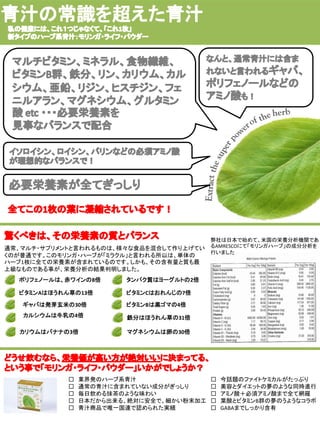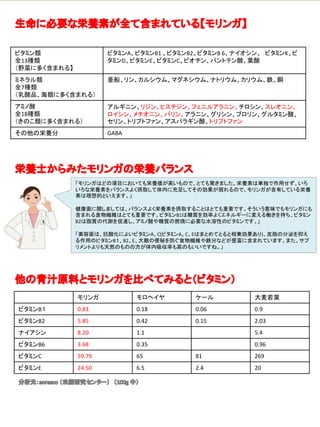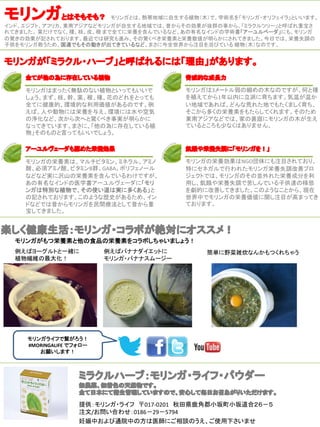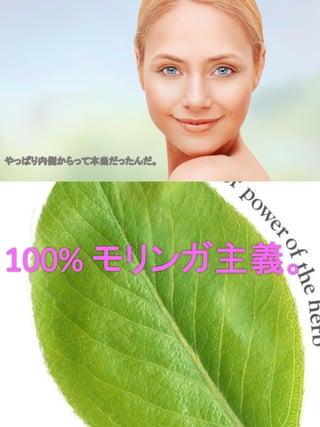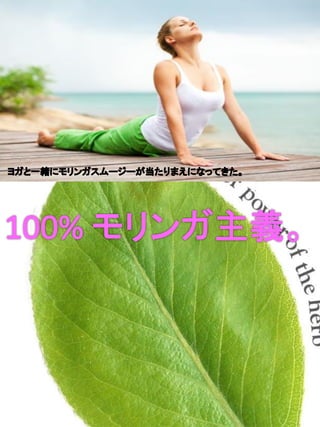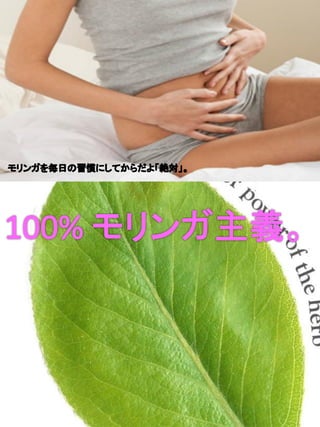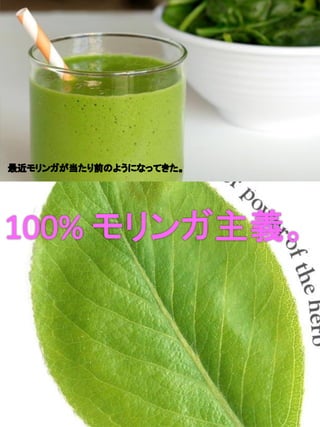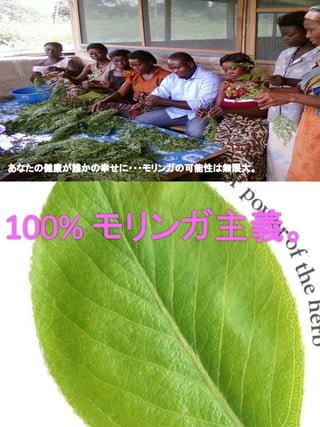Moringa lifepowder brochures
- 1. ±◊…Á§œ»’±æ§« º§·§∆°¢√◊π˙§Œñ—B∑÷ŒˆôCÈv§«§¢ Õ®≥£°¢•fi•Î•¡?•µ•◊•Í•·•Û•»§»—‘§Ô§Ï§Î§‚§Œ§œ°¢òî°©§ ≥∆∑§ÚªÏ∫œ§∑§∆◊˜§Í…œ§≤§∆§§ §ÎAMRESCO§À§∆°∏•‚•Í•Û•¨•œ©`•÷°π§Œ≥…∑÷∑÷Œˆ§Ú ––§§§fi§∑§ø §Ø§Œ§¨∆’Õ®§«§π°£§≥§Œ•‚•Í•Û•¨?•œ©`•÷§¨°∏•fl•È•Ø•Î°π§»—‘§Ô§Ï§ÎÀ˘“‘§œ°¢ÖgçŒ •œ©`•÷1√∂§À»´§∆§Œñ—BÀÿ§¨∫¨§fi§Ï§∆§§§Î§Œ§«§π°£§∑§´§‚°¢§Ω§Œ∫¨”–¡ø§»Ÿ|§‚◊Ó …œºâ§ §‚§Œ§«§¢§Î ¬§¨°¢ñ—B∑÷Œˆ§ŒΩYπ˚≈–√˜§∑§fi§∑§ø°£ •›•Í•’•ß•Œ©`•Î§œ°¢≥‡•Ô•§•Û§Œ8±∂ •ø•Û•—•ØŸ|§œ•Ë©`•∞•Î•»§Œ2±∂ •”•ø•fl•ÛA§œ§€§¶§Ï§Û≤›§Œ13±∂ •”•ø•fl•ÛC§œ§™§Ï§Û§∏§Œ7±∂ •Æ•„•–§œ∞k—ø–˛√◊§Œ30±∂ •”•ø•fl•ÛB§œ¸\•¥•fi§Œ4±∂ •´•Î•∑•¶•‡§œ≈£»È§Œ4±∂ ‚ü∑÷§œ§€§¶§Ï§Û≤›§Œ31±∂ •´•Í•¶•‡§œ•–• • §Œ3±∂ •fi•∞•Õ•∑•¶•‡§œ¬—§Œ30±∂ °ı òIΩÁ∞k§Œ•œ©`•÷œµ«‡÷≠ °ı ΩÒ‘íÓ}§Œ•’•°•§•»•±•fl•´•Î§¨§ø§√§◊§Í °ı Õ®≥£§Œ«‡÷≠§À∫¨§fi§Ï§∆§§§ §§≥…∑÷§¨§Æ§√§∑§Í °ı √¿»›§»•¿•§•®•√•»§ŒâÙ§Œ§Ë§¶§ Õ¨ïrflM–– °ı ö∞»’Ô㧷§Îƒ®≤˧Œ§Ë§¶§ Œ∂§Ô§§ °ı •¢•fl•ŒÀ·£´±ÿÌö•¢•fl•ŒÀ·§fi§«»´§∆æW¡_ °ı »’±æ§¿§´§È≥ˆ¿¥§Î°¢Ω~åù§À∞≤»´§«°¢ºö§´§§∑€ƒ©º”π§ °ı »~À·§»•”•ø•fl•ÛB»∫§ŒâÙ§Œ§¶§Ë§¶§ •≥•È•‹ °ı «‡÷≠…Ã∆∑§«Œ®“ªπ˙flB§«’J§·§È§Ï§øågøÉ °ı GABA§fi§«§∑§√§´§Í∫¨”–
- 2. •”•ø•fl•Û¿‡ •”•ø•fl•ÛA°¢•”•ø•fl•ÛB1 °¢•”•ø•fl•ÛB2°¢•”•ø•fl•ÛB 6°¢• •§•™•∑•Û°¢ •”•ø•fl•ÛK°¢•” »´13∑NÓê •ø•fl•ÛD°¢•”•ø•fl•ÛE°¢•”•ø•fl•ÛC°¢•”•™•¡•Û°¢•—•Û•»•∆•ÛÀ·°¢»~À· £®“∞≤À§À∂‡§Ø∫¨§fi§Ï§Î°ø •fl•Õ•È•ÎÓê ÅÑ¥¨°¢•Í•Û°¢•´•Î•∑•¶•‡°¢•fi•∞•Õ•∑•¶•‡°¢• •»•Í•¶•‡°¢•´•Í•¶•‡°¢‚ü°¢„~ »´7∑NÓê £®»ÈÀ·∆∑°¢∫£Óê§À∂‡§Ø∫¨§fi§Ï§Î£© •¢•fl•ŒÀ· •¢•Î•Æ•À•Û°¢•Í•∏•Û°¢•“•π•¡•∏•Û°¢•’•ß•À•Î•¢•È•À•Û°¢•¡•Ì•∑•Û°¢•π•Ï•™•À•Û°¢ »´18∑NÓê •Ì•§•∑•Û°¢•·•¡•™•À•Û°¢•–•Í•Û°¢•¢•È•À•Û°¢•∞•Í•∑•Û°¢•÷•Ì•Í•Û°¢•∞•Î•ø•fl•ÛÀ·°¢ £®§≠§Œ§≥Óê§À∂‡§Ø∫¨§fi§Ï§Î£© •ª•Í•Û°¢•»•Í•◊•»•’•°•Û°¢•¢•π•—•È•Æ•ÛÀ·°¢•»•Í•◊•»•’•°•Û §Ω§ŒÀ˚§Œñ—B∑÷ GABA °∏•‚•Í•Û•¨§œ§…§ŒÌóƒø§À§™§§§∆§‚ñ—BÅ˝§¨∏fl§§§‚§Œ§«°¢§»§∆§‚Û@§≠§fi§∑§ø°£ñ—BÀÿ§œÖg∂¿§«◊˜”√§ª§∫°¢§§§Ì §§§Ì§ ñ—BÀÿ§Ú•–•È•Û•π§Ë§Øìî»°§∑§∆Ã⁄§À≥‰◊„§∑§∆§Ω§ŒÑøπ˚§¨¨F§Ï§Î§Œ§«°¢•‚•Í•Û•¨§¨∫¨”–§∑§∆§§§Îñ—B Àÿ§œ¿ÌœÎµƒ§»§§§®§fi§π°£°π Ω°øµ√ʧÀÈv§∑§fi§∑§∆§œ°¢•–•È•Û•π§Ë§Øñ—BÀÿ§Úìî»°§π§Î§≥§»§œ§»§∆§‚÷ÿ“™§«§π°£§Ω§¶§§§¶“‚Œ∂§«§‚•‚•Í•Û•¨§À§‚ ∫¨§fi§Ï§Î ≥ŒÔøçæS§œ§»§∆§‚÷ÿ“™§«§π°£•”•ø•fl•ÛB1§œÃ«Ÿ|§ÚÑø¬ §Ë§Ø•®•Õ•Î•Æ©`§À≧®§ÎÉP§≠§Ú≥÷§¡°¢•”•ø•fl•Û B2§œ÷¨Ÿ|§Œ¥˙÷x§Ú¥ŸflM§∑°¢•¢•fl•ŒÀ·§‰Ã«Ÿ|§Œ»ºüܧÀ±ÿ“™§ ÀÆ»‹–‘§Œ•”•ø•fl•Û§«§π°£°π °∏√¿»›√ʧœ°¢øπÀ·ªØ§À§Ë§§•”•ø•fl•ÛA°¢C(•”•ø•fl•ÛA°¢C°¢E§œ§fi§»§·§∆§»§Î§»œ‡Å\Ñøπ˚§¢§Í)°¢∆§÷¨§Œ∑÷√⁄§Ú“÷§® §Î◊˜”√§Œ•”•ø•fl•ÛB£±°¢B2°¢E°¢¥Ûî≥§Œ±„√ÿ§Ú∑¿§∞ ≥ŒÔøçæS§‰‚ü∑÷§ §…§¨ÿN∏ª§À∫¨§fi§Ï§∆§§§fi§π°£§fi§ø°¢•µ•◊ •Í•·•Û•»§Ë§Í§‚ÃÏ»ª§Œ§‚§Œ§Œ∑Ω§¨Ãƒ⁄Œ¸Ö߬ §‚∏fl§Œ§‚§§§§§«§π§Õ°£°π •‚•Í•Û•¨ •‚•Ì•ÿ•§•‰ •±©`•Î ¥Û¬Û»Ù»~ •”•ø•fl•ÛB£± 0.83 0.18 0.06 0.9 •”•ø•fl•ÛB2 5.85 0.42 0.15 2.03 • •§•¢•∑•Û 8.20 1.1 5.4 •”•ø•fl•ÛB6 3.68 0.35 0.96 •”•ø•fl•ÛC 59.79 65 81 269 •”•ø•fl•ÛE 24.50 6.5 2.4 20
- 3. •‚•Í•Û•¨§»§œ°¢ü·é°µÿ”Ú§À◊‘…˙§π§Î÷≤ŒÔ£®ƒæ£©§«°¢—ß–g√˚§Ú°∏•‚•Í•Û•¨?•™•Í•’•ß•§•È°π§»§§§§§fi§π°£ •§•Û•…°¢•®•∏•◊•»°¢•¢•’•Í•´°¢ñ|ƒœ•¢•∏•¢§ §…•‚•Í•Û•¨§¨◊‘…˙§π§Îµÿ”Ú§«§œ°¢ŒÙ§´§È§Ω§ŒÑøπ˚§¨íi»∫§Œ ¬§´§È°¢°∏•fl•È•Ø•Î•ƒ•Í©`°π§»∫Ù§–§Ï÷ÿ±¶§µ §Ï§∆§≠§fi§∑§ø°£ »~§¿§±§«§ §Ø°¢∑N°¢÷¶°¢∆§°¢∏˘ §fi§«»´§∆§Àñ—B§Ú∫¨§Û§«§§§Î§ §…°¢§¢§Œ”–√˚§ •§•Û•…§Œ—ß–gﯰ∏•¢©`•Ê•Î•Ÿ©`•¿°π§À§‚°¢•‚•Í•Û•¨ §ŒÛ@§≠§ŒÑøπ˚§¨”õ§µ§Ï§∆§™§Í§fi§π°£◊ÓΩ¸§«§œ—–æø§‚flM§fl°¢§Ω§ŒÛ@§Ø§Ÿ§≠ñ—BÀÿ§»ñ—B ˝Ç駨√˜§È§´§À§µ§Ï§∆§≠§fi§∑§ø°£ΩÒ»’§«§œ°¢ñ—B ß’{§Œ ◊”π©§Ú•‚•Í•Û•¨æ»§¶§ø§·°¢π˙flB§«§‚§Ω§ŒÑ”§≠§¨≥ˆ§∆§≠§∆§§§Î§ §…°¢§fi§µ§ÀΩÒ»´ ¿ΩÁ§´§È◊¢ƒø§Ú‘°§”§∆§§§Î ÷≤ŒÔ£®ƒæ£©§ §Œ§«§π°£ •‚•Í•Û•¨§œ§fi§√§ø§ØüoÒj§Œ§ §§÷≤ŒÔ§»§§§√§∆§‚§§§§§« •‚•Í•Û•¨§œ3•·©`•»•Î»ı§Œºö§·§Œƒæ§ §Œ§«§π§¨°¢∫Œ§»∑N §∑§Á§¶°£§fi§∫°¢÷¶°¢é÷°¢»~°¢∏˘°¢∑N°¢ª®§Œ§…§Ï§Ú§»§√§∆§‚ §Ú÷≤§®§∆§´§È1ƒÍ“‘ƒ⁄§À¡¢≈…§À”˝§¡§fi§π°£ö›Œ¬§¨Œ¬§´ »´§∆§ÀΩ°øµµƒ°¢≠hæ≥µƒ§ ¿˚”√Å˝Ç駨§¢§Î§Œ§«§π°£¿˝ §§µÿ”Ú§«§¢§Ï§–°¢§…§Û§ ªƒ§Ï§øµÿ§«§‚§ø§Ø§fi§∑§Ø”˝§¡°¢ §®§–°¢»À§‰Ñ”ŒÔ§À§œñ—B§Ú”Χ®°¢≠hæ≥§À§œÀƧ‰ø’ö› §Ω§≥§´§È∂‡§Ø§Œñ—BÀÿ§Ú§‚§ø§È§∑§∆§Ø§Ï§fi§π°£§Ω§Œ§ø§· §Œõ∑ªØ§ §…°¢¥Œ§´§È¥Œ§ÿ§»Û@§Ø§Ÿ§≠ ¬åg§¨√˜§È§´§À ñ|ƒœ•¢•∏•¢§ §…§«§œ°¢º“§Œ—YÕ•§À•‚•Í•Û•¨§Œƒæ§¨…˙§® § §√§∆§≠§∆§§§fi§π°£§fi§µ§À°¢°∏À˚§ŒûȧÀ¥Ê‘⁄§∑§∆§§§Î÷≤ §∆§§§Î§»§≥§Ì§‚…Ÿ§ §Ø§œ§¢§Í§fi§ª§Û°£ ŒÔ°π§Ω§Œ§‚§Œ§»—‘§√§∆§‚§§§§§«§∑§Á§¶°£ •‚•Í•Û•¨§Œñ—BÀÿ§œ°¢•fi•Î•¡•”•ø•fl•Û°¢•fl•Õ•È•Î°¢•¢•fl•Œ •‚•Í•Û•¨§Œñ—BÑøπ˚§œNGOá‚çÀ§‚◊¢ƒø§µ§Ï§∆§™§Í°¢ À·°¢±ÿÌö•¢•fl•ŒÀ·°¢•”•ø•fl•ÛB»∫°¢GABA°¢•›•Í•’•ß•Œ©`•Î Ãÿ§À•ª•Õ•¨•Î§«––§Ô§Ï§ø•‚•Í•Û•¨ñ—B ß’{∏ƒ…∆•◊•Ì § §…§ §…åg§Àõg…Ω§Œñ—BÀÿ§Ú∫¨§Û§«§§§Î§Ô§±§«§π§¨°¢ •∏•ß•Ø•»§«§œ°¢•‚•Í•Û•¨§Œ§Ω§ŒÅKÕ‚§Ï§øñ—B≥…∑÷§Ú¿˚ §¢§Œ”–√˚§ •§•Û•…§Œ“Ω—ßﯕ¢©`•Ê•Î•Ù•ß©`•¿§À°∏•‚•Í ”√§∑°¢Ô|I§‰ñ—B ß’{§«ø‡§∑§Û§«§§§Î◊”π©fl_§ŒòîëB •Û•¨§œÃÿÑe§ ÷≤ŒÔ§«°¢§Ω§Œ 𧧵¿§œåg§À∂‡§Ø§¢§Î°π§» §ÚÑ°µƒ§À∏ƒ…∆§∑§∆§≠§fi§∑§ø°£§≥§Œ§Ë§¶§ §≥§»§´§È°¢¨F‘⁄ §Œ”õ§µ§Ï§∆§™§Í§fi§π°£§≥§Œ§Ë§¶§ ös ∑§¨§¢§Î§ø§·°¢•§•Û ¿ΩÁ÷–§«•‚•Í•Û•¨§Œñ—BÅ˝Çé§ÀÈv§∑◊¢ƒø§¨∏fl§fi§√§∆§≠ •…§ §…§«§œŒÙ§´§È•‚•Í•Û•¨§Ú√ÒÈgØü∑®§»§∑§∆ŒÙ§´§È÷ÿ §∆§™§Í§fi§π°£ ±¶§∑§∆§≠§fi§∑§ø°£ •‚•Í•Û•¨§¨§‚§ƒñ—BÀÿ§»À˚§Œ ≥∆∑§Œñ—BÀÿ§Ú•≥•È•‹§∑§¡§„§§§fi§∑§Á§¶£° ¿˝§®§–•Ë©`•∞•Î•»§»“ªæw§À ¿˝§®§–•–• • •¿•§•®•√•»§À ∫ÜÖg§À“∞≤ÀÎj¥∂§ §Û§´§‚§ƒ§Ø§Ï§¡§„§¶ ÷≤ŒÔøçæS§Œ◊ӥ۪أ° •‚•Í•Û•¨?•–• • •π•‡©`•∏©` •‚•Í•Û•¨•È•§•’§«ø駨§Ì§¶£° #MORINGALIFE §«•’•©•Ì©` §™Ó䧧§∑§fi§π£° ÷π©£∫•‚•Í•Û•¨?•È•§•’ ®ì017-0201 «ÔÃÔ±h¬πΩ«ø§–°€‡ÓÆ–°€‡µ¿∫œ£≤£∂£≠£µ ◊¢Œƒ/§™Üñ§§∫œ§Ô§ª£∫0186£≠29£≠5794 »—…Ô÷–§™§Ë§”Õ®‘∫÷–§Œ∑Ω§œ“Ωéü§À§¥œ‡’ѧŒ§¶§®°¢§¥ π”√œ¬§µ§§§fi§ª

